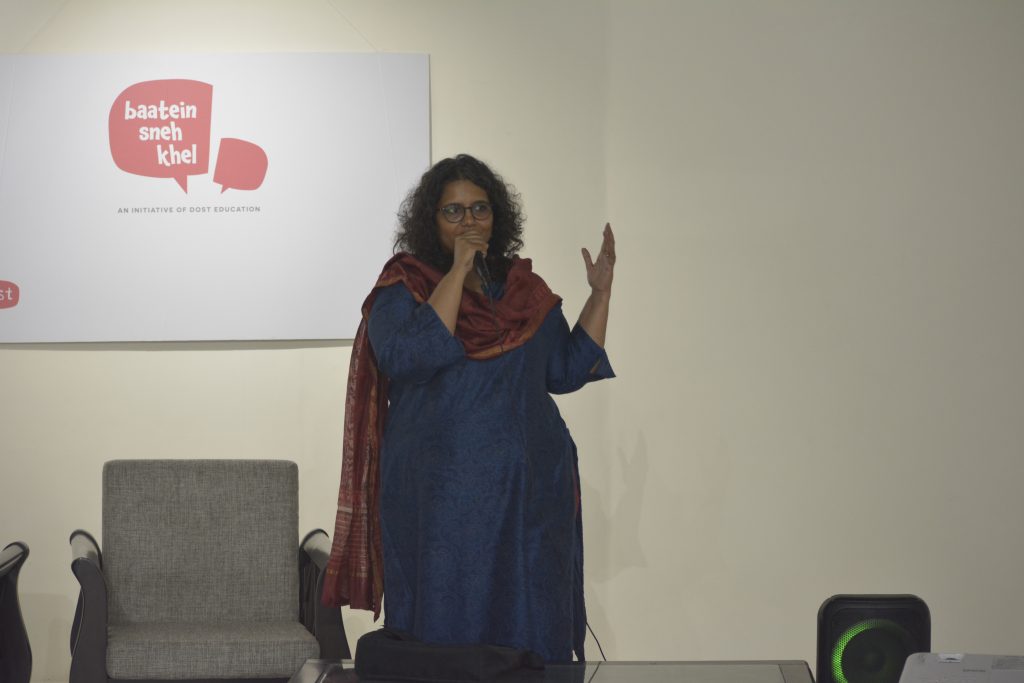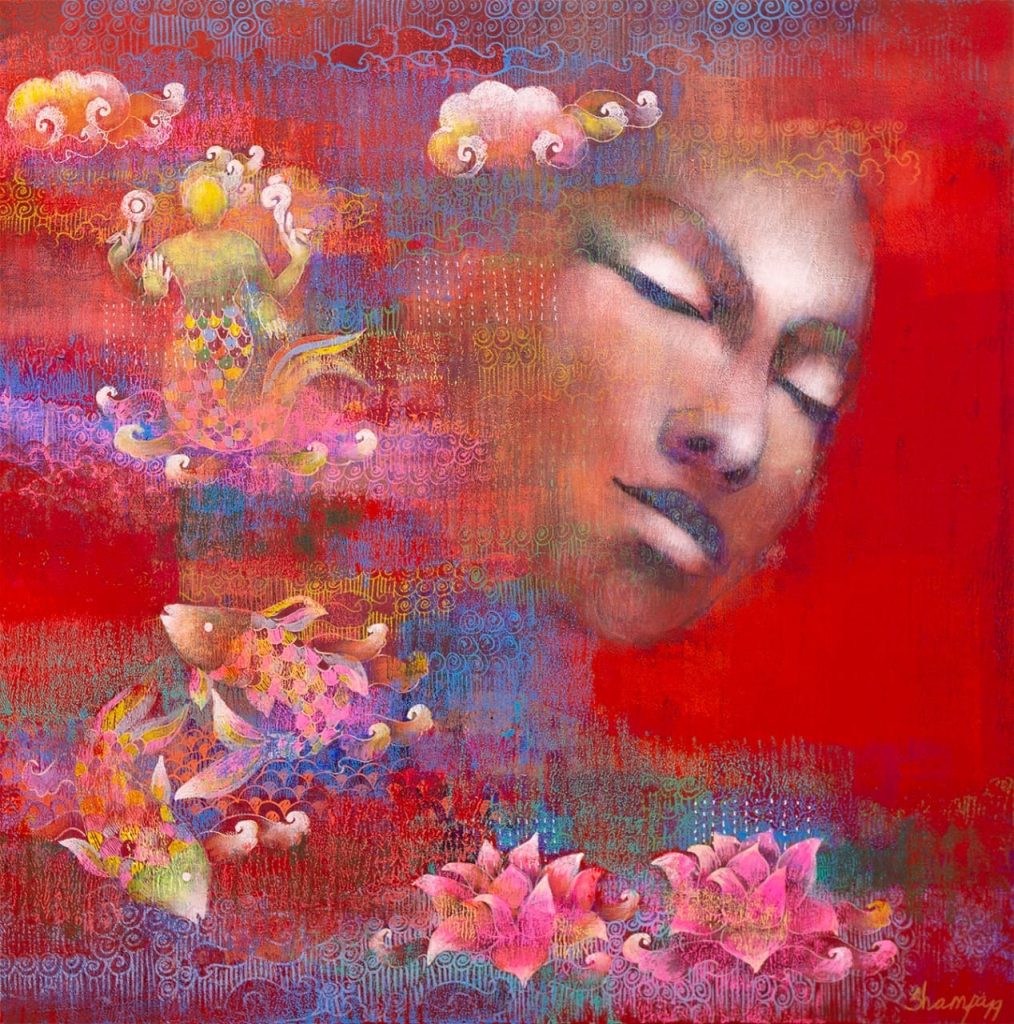On Friday, a collection of photographs capturing instances of nurturing caregivers was exhibited at the Lokyata Art Gallery in Hauz Khas. The show was called “Baatein, Sneh and Khel.” The presentation was a collaborative effort by the Dost Foundation and the Ekstep Foundation. Several distinct family types in Uttrakhand were examined, including families from rural areas, urban areas, and smaller communities. The exhibition helps us understand the daily life of someone who takes care and also teaches children new things every day. The objective was to celebrate and acknowledge the instances when individuals provide care for childrens within their households, irrespective of their family structure or living arrangements. We do not recognize the learning of children who are younger than six years old. Through their daily learning, they enhance their emotional intelligence, social skills, and literacy abilities. Exhibition’s focus was on examining the impact of intentional or unintentional actions of families on their thought processes, regardless of their level of awareness.
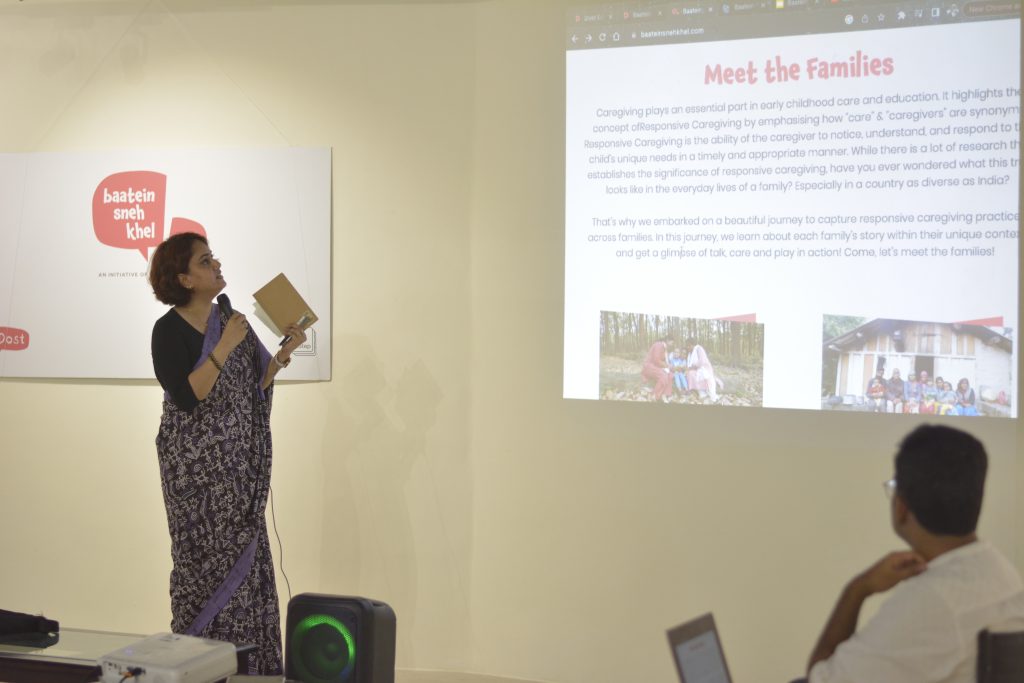
This special program called “Baatien, Sneh, Khel” shared stories about taking care of children that were rooted in different cultures. These stories were supported by research on how children grow and learn in their early years. Visitors had the special opportunity to learn heart warming stories about caring for children, and also participate in interesting discussions about the important things that help children grow in every way. The microsite had a collection of interesting real-life photo stories. These stories displayed moments of caring for children in families. The goal was to make people feel connected, learn, and get inspired about taking care of young children.
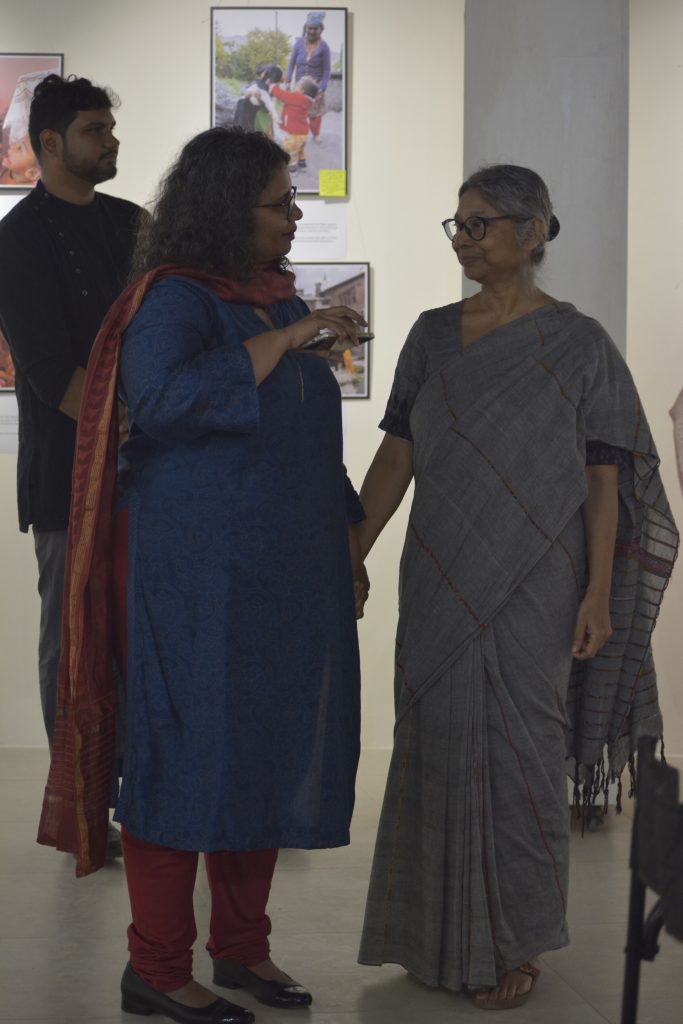
The development of a child greatly depends on responsive caregiving. When parents possess affection and actively acknowledge their children’s needs, the impact can be substantial and enduring throughout their entire existence. The National Curriculum Framework (NCF) recognizes how important the first eight years of a child’s life are. It is of the opinion that these years lay the groundwork for enduring happiness and holistic growth. The title is bestowed upon individuals who have successfully completed their higher education and acquired a doctorate degree. Venita Kaul, an esteemed authority in the field of Early Childhood Development (ECD) and Director at Ambedkar University, emphasized the crucial role of engaging and interactive games that parents actively participate in with their children. These games are really good for kids, but people don’t always notice that. Despite lacking knowledge about Early Childhood Development, the images depict parents engaging in appropriate activities with their children.
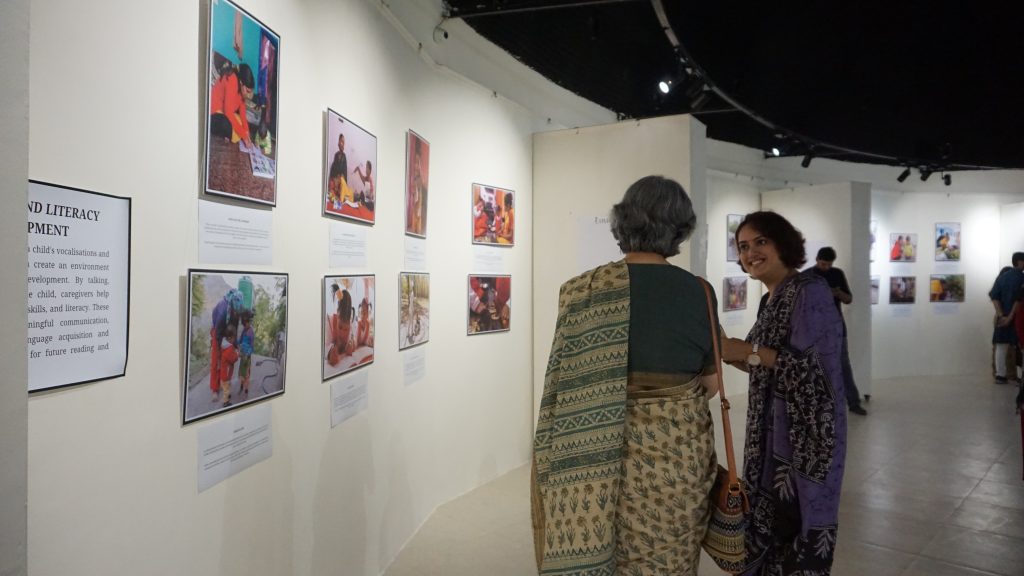
Deepika Mogilishetty, an expert in policy and partnerships at the renowned Ekstep Foundation, shed light on a crucial issue revolving around the complex nature of showcasing and elucidating Early Childhood Development (ECD). She said this exhibition is a big step in explaining and filling a big gap in early childhood development. Mrs. Mogilishetty said it is important to strongly support Early Childhood Development (ECD) as mentioned in the National Education Policy. “Baatien, Sneh, Khel” uses fun pictures and stories to teach people how to care for others. These conversations can empower caregivers by illustrating the significant impact they hold and inspiring them to generate exceptional ideas that will shape a bright future for their children.
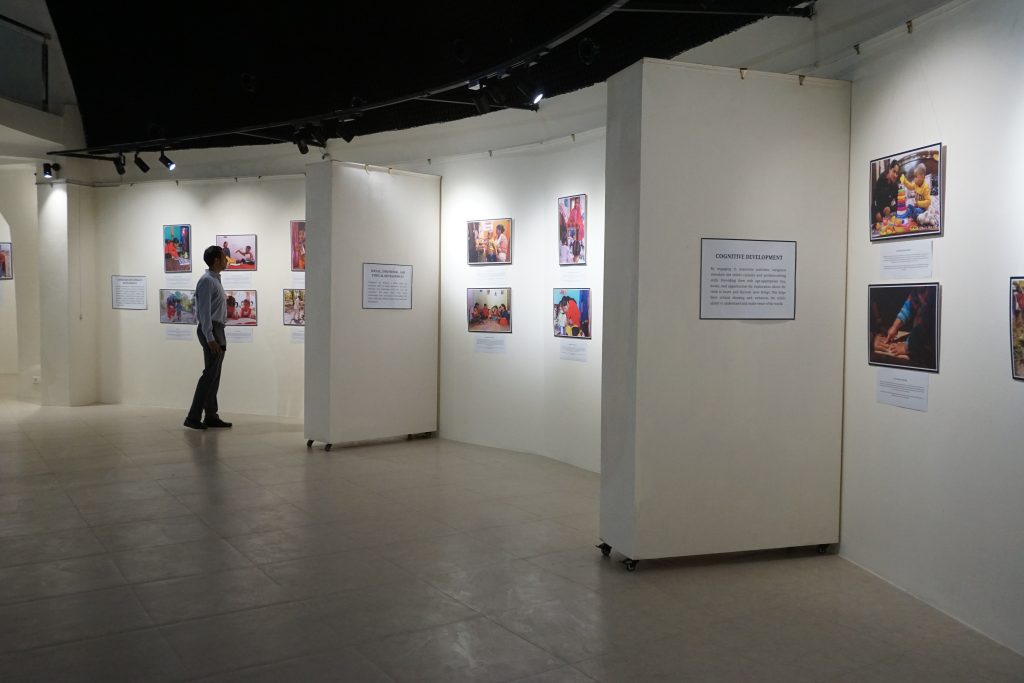
The exhibition was explored in different ways, one of which was Positive Parenting. Positive Parenting is the practice of creating a supportive and empowering atmosphere by parents, showing understanding and fulfilling their child’s needs with love, consistency, and respect. By using positive parenting methods, adults help children feel good about themselves and develop strong emotions. Another important thing to focus on is Physical Development, which means taking care of a child’s exercise, food, changing their diaper, and making sure they feel safe and healthy. This helps a child grow up healthy and learn important physical skills. Next is the part about Aesthetic and Cultural Development, where the child gets to experience and learn about different aesthetics and cultures. Parents can teach their children about music, art, dance, and customs that represent the child’s cultural background. By doing these activities together and showing appreciation, caregivers help the child learn about different cultures and develop a sense of identity and diversity. In the part about how children think and learn, caregivers encourage them to ask questions and figure out solutions to problems. Giving children things like toys and books that are suitable for their age, and giving them chances to explore, helps them to learn and find out about new things. This helps them think better and improves the child’s ability to understand and make sense of the world. Social, Emotional, and Ethical Development is a crucial aspect of a child’s growth. It involves the role of caregivers in nurturing the child’s social and emotional skills through compassionate and attentive responses to their feelings. This helps them make strong bonds, trust, and good relationships with others. Additionally, it contributes to the nurturing of virtuous principles and expanding one’s knowledge of ethical distinctions. Learning and being able to read and write is very important. Adults who take care of children play an important part in helping them learn how to speak and communicate. They make a place for the child to learn language. Additionally, it contributes to the nurturing of virtuous principles and expanding one’s knowledge of ethical distinctions. These conversations help people talk and understand each other, which is important for learning a language and getting better at reading and writing later on.’
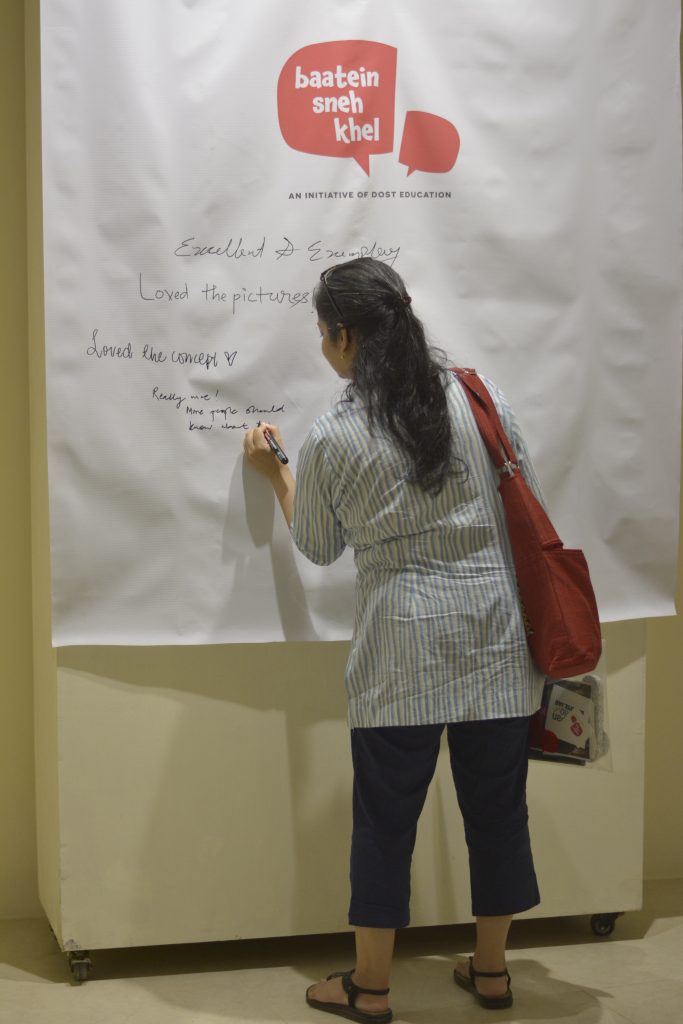
Rashmi, a experienced researcher from Dost Foundation, explained to us the first idea of the research. She said, “I learned that most of our brain grows before we turn six. This made me think that we only focus on the remaining ten percent for the rest of our lives. And then I understood that talking to or doing activities with children under three years old is meaningful. The brain starts to grow only from that particular spot. Kids always listen and learn. They watch and pay attention to the surrounding things. We did a study where we purposely chose different places to make sure there were different kinds of families involved. Furthermore, we made sure to include families with various types of structures to carefully study the times when people take care of others. Before we started filming, our idea was to gather basic information about each of these families such as their age, gender, and where they live. To really know them, we went the extra mile by meeting them and having meaningful talks. We divided it into different categories. Positive parenting is when a parent does something with their child that helps the child grow and develop, whether they mean to or not. Every family had their own methods of teaching children different stories.”
Feature Image Courtesy: Dost Foundation

Contributor

